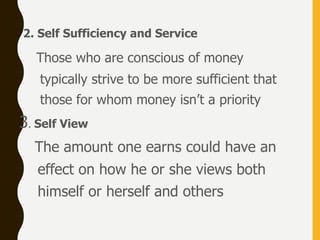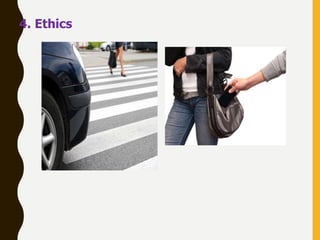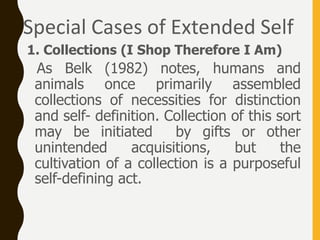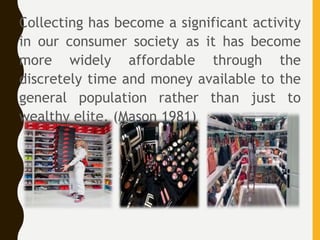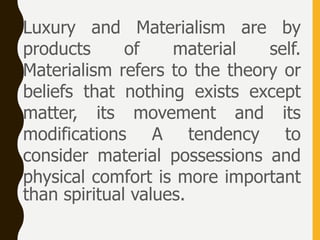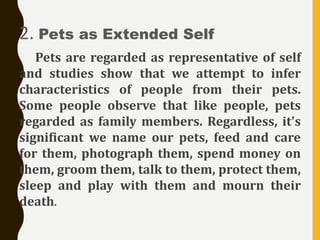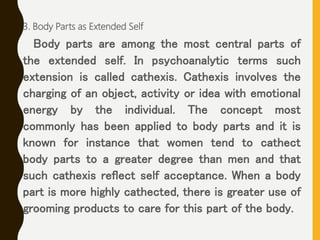The Material Self
- 1. CHAPTER II LESSON 2 THE MATERIAL SELF “TO BUY OR NOT TO BUY”
- 2. “A man’s material self is the sum total of all he can call his” This includes his body family and reputation
- 3. Clothes and house.. His lands and horses and yatch and bank accounts”.
- 4. IF ONE’S MATERIAL POSSESSIONS INCREASE THE POSSESSOR FEELS TRIUMPHANT
- 5. EFFECT OF MATERIAL POSSESSIONS Curtis (2017) cited that cash can have serious bearing on one’s belief regarding the way a person views himself or herself .
- 6. The following are evidences behind the idea that money can truly change people: value. 1 . Social and Business value Heyman and Ariely (2004) summised that there are two motivations for completing a given task. The first is social , by recognizing a task social value a person sees it as a help out. When money is offered as the motivation, however , people then start thinking less of the social aspect and more about the business
- 7. 2. Self Sufficiency and Service Those who are conscious of money typically strive to be more sufficient that those for whom money isn’t a priority 3. Self View The amount one earns could have an effect on how he or she views both himself or herself and others
- 8. 4. Ethics
- 9. • Many addiction (not only on drugs) begin because a person gets a positive response from a certain type of behavior
- 10. POSSESSIONS AND THE EXTENDED SELF The premise that people regard their possessions as parts of themselves is not new. Goffman (1961) provides a thorough review of the evidence of deliberate lessening of self manifested in such institutions as mental hospitals, homes for the aged, prisons, concentration camps, military training camps, boarding schools, and monasteries. One of the first step in receiving new members into these institution is to systematically deprive them of all personal possessions including clothing, money, and even names.
- 11. Handbag snatching can produce not only a financial but also an emotional, long-term effect on victims. Similarly, losing photographs of loved ones that are often carried in a purse, may cause the victims security impaired; they tend to distrust and feel suspicious towards other people and develop a fear of walking in public and even in a similar environments. Research has also found that victims sometimes describe possessions as having high sentimental value and being much more than functional.
- 12. Special Cases of Extended Self 1. Collections (I Shop Therefore I Am) As Belk (1982) notes, humans and animals once primarily assembled collections of necessities for distinction and self- definition. Collection of this sort may be initiated by gifts or other unintended acquisitions, but the cultivation of a collection is a purposeful self-defining act.
- 13. Collecting has become a significant activity in our consumer society as it has become more widely affordable through the discretely time and money available to the general population rather than just to wealthy elite. (Mason 1981)
- 14. Luxury and Materialism are by products of material self. Materialism refers to the theory or beliefs that nothing exists except matter, its movement and its modifications A tendency to consider material possessions and physical comfort is more important than spiritual values.
- 15. I Shop Therefore I Am A person is defined by what he thinks , but by what he owns. Shopping is an expressive and constitutive existential act.
- 16. People are created to be loved, and the things were created to be used ; the reason why the world is in so much chaos right now is because people are being used and things are being loved”.
- 17. 2. Pets as Extended Self Pets are regarded as representative of self and studies show that we attempt to infer characteristics of people from their pets. Some people observe that like people, pets regarded as family members. Regardless, it's significant we name our pets, feed and care for them, photograph them, spend money on them, groom them, talk to them, protect them, sleep and play with them and mourn their death.
- 18. Levinson(1972) and Robin and Bensel (1985) found that pets are so instrumental to self identity that they are often useful as transition objects (surrogate parents) for children and surrogate children for adults. These observations suggest that pets can be therapeutic in expanding the self of children, hospital patient and the elderly.
- 19. 3. Body Parts as Extended Self Body parts are among the most central parts of the extended self. In psychoanalytic terms such extension is called cathexis. Cathexis involves the charging of an object, activity or idea with emotional energy by the individual. The concept most commonly has been applied to body parts and it is known for instance that women tend to cathect body parts to a greater degree than men and that such cathexis reflect self acceptance. When a body part is more highly cathected, there is greater use of grooming products to care for this part of the body.






